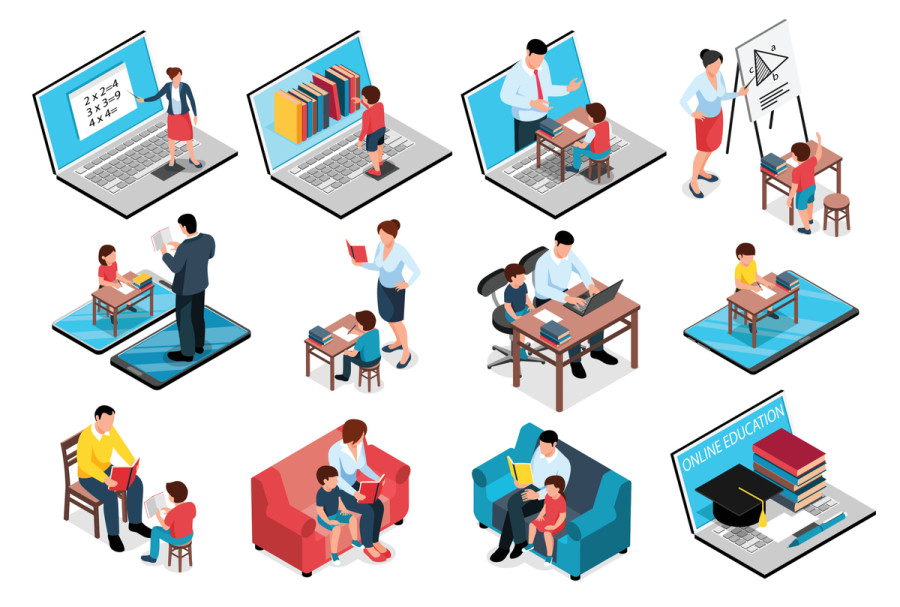Columns
Is online teaching really worth it?
School administrators coercing students to adapt technologies of learning better learn what the digital divide means.
Dinesh Kafle
Last week, a journalist friend of mine received a call from his son’s Montessori teacher, who asked him to come online on Viber. The reason, the teacher told my friend, was that she wanted to teach her pupil how to draw a straight line. That, she said, was the lesson plan for the day.
Soon, my friend also received a reminder from the teacher that the son's tuition fees were due. Having been initiated on Saraswati Puja, the toddler went to Montessori for less than a couple of weeks before falling ill due to pollution and staying home. It took my friend the teacher's friendly reminder to realise that the real reason for the teacher asking for the toddler, two months shy of three years, to be brought online to draw a straight line was not so straightforward after all.
Twenty years ago, when I was finishing secondary level education at a private boarding school, my mother said my education was a house of cards, with banknotes making the cards. Only one card needs to go astray for the whole house to come tumbling down, she said. I believe I now understand—albeit partly—why my mother used that metaphor, having to spend a large portion of the money she and my father earned on their children's education. I wonder what metaphor my mother would use upon knowing how much it costs to have a child learn how to draw a straight line.
Capitalising crisis
Capitalist greed is hydra-headed. It appears in a different avatar each time we think it may get subdued. We might wishfully think the coronavirus conundrum has decapitated it temporarily if not eliminated permanently, but human greed for capital accumulation has found its new champions in, among others, corporate leaders of the education world. With their newfound obsession for online live teaching thanks to the lockdown, educational institutions are now coercing students—and in effect their unsuspecting parents—into adopting, and spending huge resources on, technology.
The tech-savvy and resourceful among us might be impressed by these sassy technologies that have found their ways into the lives of our children and ourselves. Parents and teachers alike are, after all, sharing screenshots of their children or students attending classes on Zoom and Google Meet. But if we are to step out of our own echo chambers, we would know that there is a world outside—of migrant Nepalis who are still heading home averting the eyes of the police, working in the fields and desperately trying to find ways to put food to the table. They all hope to provide the best education to their children and would do everything they could to ensure their hope translates into reality. But to expect them to come at par with those of us who have the luxury to stay home and provide our spare laptops to our children and share our enthusiasm for the adoption of technology is downright unrealistic and even unethical.
Moreover, online teaching it is a temporary arrangement—after all, the lockdown will be lifted once the pandemic crisis is over—it makes little sense to put a financial burden on guardians who are already scrambling to feed their families and are uncertain whether they can hold on to their jobs once the crisis is over. Even if online teaching is going to be the ‘it’ thing in the post-pandemic age, parents cannot be asked to make significant investments in a jiffy.
Rich countries are surely transitioning to online platforms despite the obvious glitches that appear when a large mass is collectively navigating the new terrain. But ours is a different case altogether. According to the National Demographic and Health Survey 2016, the total ownership of computers in Nepali households that year was 18 percent in urban areas and 4 percent in rural areas; the total reach of mobile phones was 94 percent in urban areas and 91 percent in rural areas; and 23 percent women and 47 percent men used the internet that year. The numbers have most certainly increased in the years that followed but poor networks and expensive data rates continue to hinder seamless connectivity for long hours and the transition to online teaching demands.
Online pedagogy
Even as we fiddle with online teaching platforms, we must consider if the online teachings are for the students or the parents or the schools themselves. Are we really concerned about a child's need or interest to learn new things or just looking for an excuse to engage them just because we feel—or the school administration says—that is the right thing to do? If the latter is true, we are depriving the children of their fundamental rights to be children and to enjoy the free time that the pandemic has provided them like never before. Even in the face of a pandemic, we are imposing the same discipline as imposed by the consumerist education system.
The internet has provided us with invaluable access to resources when it comes to learning. Without the internet, it is almost impossible to have any meaningful research done in many cases. But when school children are exposed to the internet, there is a real danger of the technology hindering their creativity. When schools impose the new pedagogies of teaching indiscriminately, without so much as considering whether Montessori or primary level children are fit to be exposed to the technology, we must ask whether the sudden enthusiasm is driven by pedagogical imperative or financial interests.
If we so much as acknowledge that urban centres like Kathmandu do not represent the entire country and that corporate schools do not represent the country's education system the majority of which comprises government schools with little resources, we must ask ourselves what the consequences of our obsession with online teaching will be. If the majority of students without access to computers and the Internet are going to feel left out, there is a real danger of the children facing psychological pressure. Rather than help cope with the new normal brought by the pandemic, we might end up reinforcing the structural inequities that are already prevalent in our society.
For long, we have been too busy to notice the small details of our own surroundings even as we chase big dreams. Rather than disciplining children into following the whims of the profit-oriented school administrators, parents would do well to put the free time provided by the pandemic to good use by telling them stories, and asking them if they ever noticed that the roadside tree they have seen for years was mulberry. As the late Urdu poet Nida Fazli wrote, ‘Let the little hands of the children touch the moon and the stars/ After reading four books, they will also be like us’.
***
What do you think?
Dear reader, we’d like to hear from you. We regularly publish letters to the editor on contemporary issues or direct responses to something the Post has recently published. Please send your letters to [email protected] with "Letter to the Editor" in the subject line. Please include your name, location, and a contact address so one of our editors can reach out to you.




 9.89°C Kathmandu
9.89°C Kathmandu















